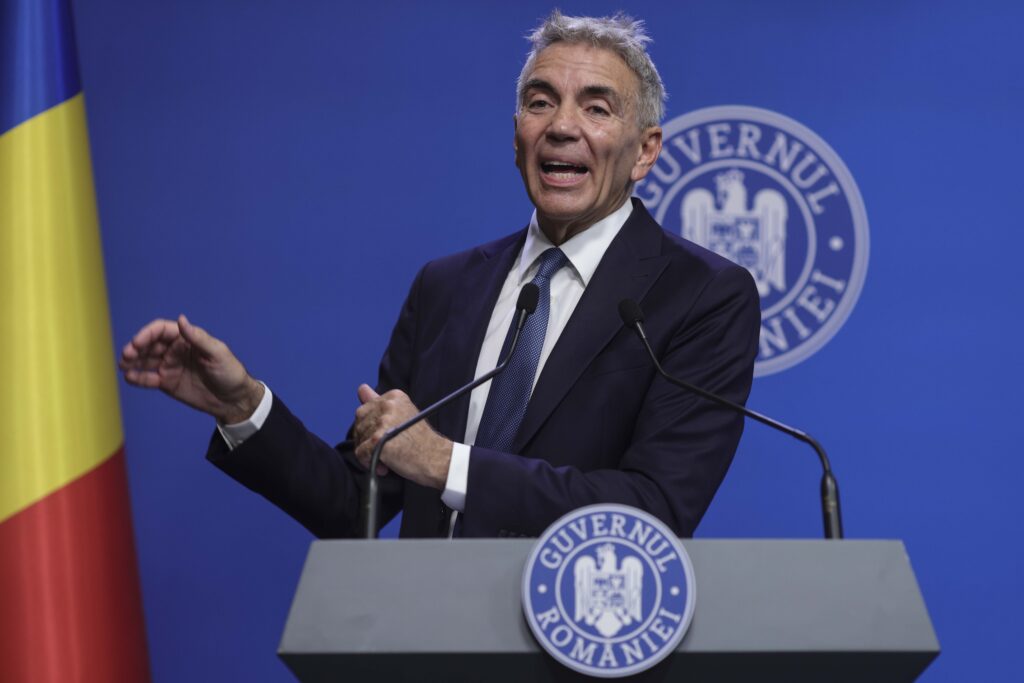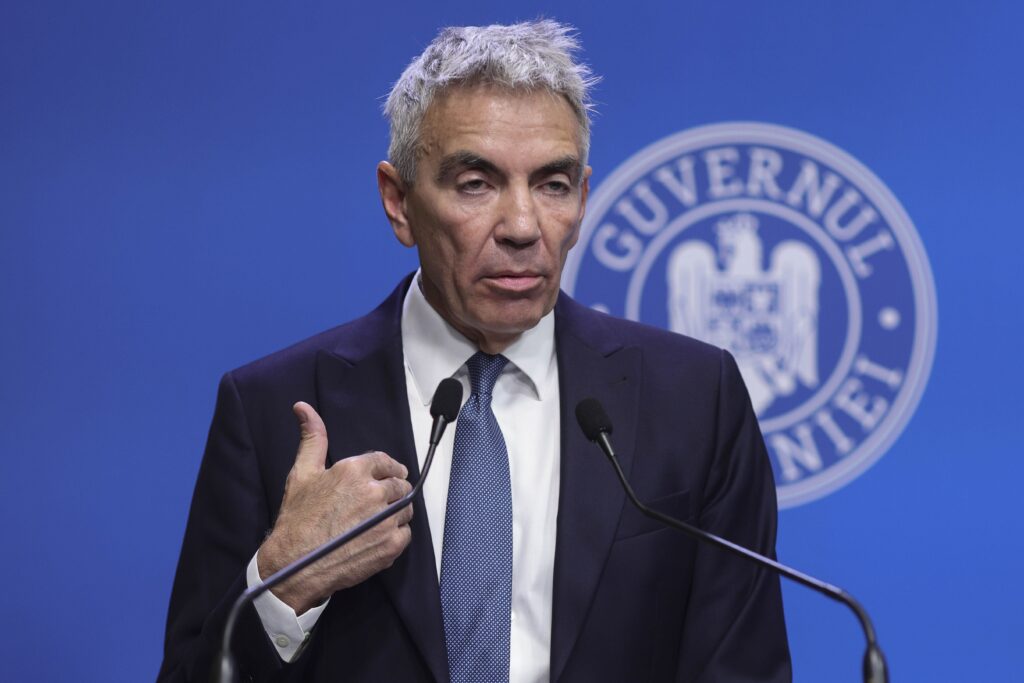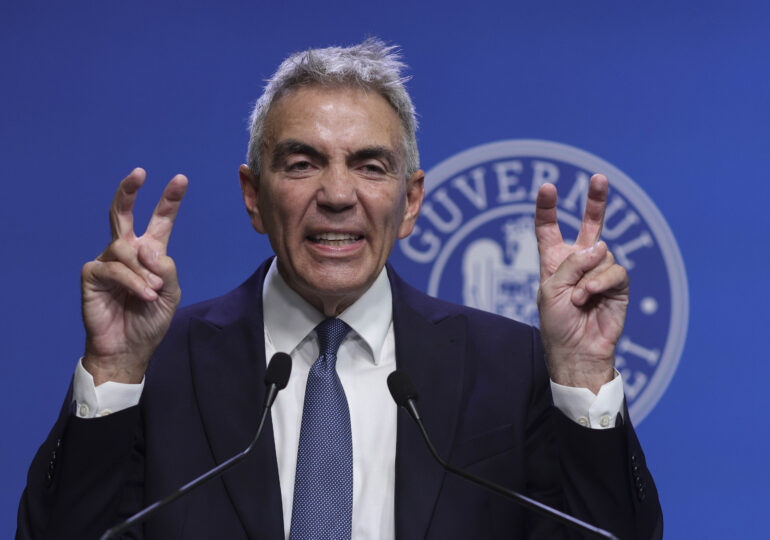Vice Prime Minister Dragoș Anastasiu, at the center of a scandal involving his alleged involvement in a case of continuous bribery to an ANAF employee, announced his resignation on Sunday evening at a press conference at Victoria Palace.
He explained why he delayed this decision, considering that the information became public on Thursday evening: he took a few days to think, to have the answers, and to reflect on the best decision to take, in order not to jeopardize either the Government or himself.
He detailed the context from 2007-2009, which led him to the decision to bribe ANAF to benefit from a favorable environment for his companies, justifying his compromise by stating that it was a bribe for survival, not for enrichment.
He also mentioned that he did not discuss this subject with Ilie Bolojan or Nicușor Dan when he accepted to take on the roles of presidential, governmental, or vice-premier advisor. He confirmed that he was verified and received an ORNISS certificate, but could not explain why his past was not considered a vulnerability for the government or presidency.
Moreover, Anastasiu stated that he did not lie and does not consider himself a briber, but an honest and integral person.
Regarding Prime Minister Bolojan's position on the scandal in which he is involved, he said that he spoke with him every day, did not ask for his resignation, but conveyed that he respects his decision.
Finally, Anastasiu stated that the reform of state-owned companies - which he hinted was the reason for this scandal erupting - must continue, and Prime Minister Bolojan is determined to implement it. He advised those who denigrated him not to rejoice too much at his departure.
And Prime Minister Bolojan announced that he will make a statement "by the afternoon."
Here are the most important statements, transmitted in LIVE TEXT format on spotmedia.ro:
I would like to start with the context we are in, a government installed for a month, with a determined and extremely firm prime minister in carrying out the reforms Romania needs.
These reforms are necessary for Romania.
We had to apply a handbrake, which affected many categories, but proved useful in avoiding degradation to junk status.
We are now in the second phase, which deals with waste, inefficiency, and inequality in Romanian society.
State-owned companies are also targeted - and this is where I come in, part of a working group to streamline them - and we expected significant resistance.
This is the moment when all the spotlight was on me, when you disturb, the world reacts. We expected it.
In this context, my involvement in an older case, which was public until now, became known.
I am not here to position myself as a victim, nor for justifications, but to provide explanations for you to understand the context.
I had a company that conducted international transport with thousands of employees, regulated in such a way that VAT had to be refunded, and when you have large volumes, you have a large VAT refund.
From 2007 to 2009, for three years, my company was investigated by the Economic Police for five years. Three people worked at the Economic Police for three years, during which our VAT refund was blocked, and the situation in the company was absolutely disastrous.
After three and a half years, I was called to the Economic Police and told that they had nothing to reproach me for. I requested the final resolution to go to ANAF to recover my VAT. I was told that after three years, the case could not be closed, too much work had been done on it, and although they found nothing, they would start criminal proceedings.
I was summoned to the Prosecutor's Office and told that they did not know what to do with the case, I made a statement, and the case was closed.

This was the moment, 2009, when ANAF came and started a 5-year audit, and my collaborators told me that our accounting was fine, but the payroll situation did not match the records at ANAF. An ANAF inspector came with a "constructive" proposal: redo the payrolls for 5 years, and we will see what comes out, or I recommend a company to handle these matters, and we will update the records accordingly.
We had to choose between possible bankruptcy or giving in to the blackmail, the proposal, and closing the case, considering that the other aspects of the audit were in order.
That was the decision we made then, my partner signed the contract with that company, and it took some time before my partner went to report these things to the DNA.
In the meantime, my collaborators redid all the payrolls, and although they were not done correctly, the amounts paid to the Romanian state were higher than what we had to pay.
At some point, there were travel requests for which the invoices were not paid for years. My collaborators told me that the person in question had created a system of terror, which is why they did not press for payment of the invoices or termination of contracts.
This is when my partner filed the complaint, and I was a witness.
In Romania, there are two types of bribes - for survival and for enrichment. From our perspective, it was about fear and survival. Throughout this period, my company paid 75 million lei in taxes to the state. We did not commit tax evasion, all our incomes were recorded, and all salaries were paid in full.
That is the reality, nothing else.
Regarding my role in the case, whether I was a witness or a whistleblower, I can only tell you what I know: I did not sign a denunciation, I was a witness, as seen in the entire indictment and what you find in this case. There may be interpretations, but I do not want to contradict; that was what I knew, what I did. My partner signed the contract, signed the denunciation.

Now, I would like to address a chapter about the abuses of the Romanian state - I have received thousands of messages these days, many of the comments heard are correct, both those with similar stories and those criticizing those who ensured their survival by yielding to state blackmail.
The atmosphere in which investors in Romania had to do their duty and contribute to the country's growth was complicated, in a partnership with the Romanian state that was not fair. The state's duty is to be a partner, not the enemy of Romanian companies.
I urge all entrepreneurs to speak up about the issues they face in their relationship with the Romanian state. I appeal to the Romanian state to do its duty.
The Romanian state currently owes billions of lei to private companies - to energy companies, for paying medical leaves, for works performed for the state (some not invoiced because there is no money, and VAT should also be paid). This is how the Romanian state operates in its relationship with private entities.
The Romanian state must become a partner. We can no longer continue like this.
What's next: my entry into the Romanian Government was to help. In this climate, it is very clear to me that I can no longer help, no matter what I say, do, the process of denigration will continue to an extreme.
This is why it is time for me to take a step to the side, to step back, and resign.
I ask Prime Minister Bolojan to take over the leadership of the state-owned companies reform himself and to continue involving representatives from the private sector. I urge representatives from the private sector not to lose heart and not to be disappointed.
Questions:
Why did you enter the Government if you knew you had bribed an ANAF official? Why did you accept to be prime minister?
First and foremost, I asked myself if I could help with something, and I answered that I could. I asked myself if everything I have done in my life so far makes me proud, and there are many things that make me very proud. I am honest, honest, I have never taken advantage of the Romanian state. As long as it was about choosing between ensuring the survival of the company, the people, and making this compromise, I chose this compromise. I made a mistake by losing sight of it for so long. I considered this compromise acceptable to be able to do something for my country.
A company managed by your life partner has concluded contracts in recent years with public institutions, especially in areas where PNL strongholds are. Are you aware of this situation?
This has nothing to do with the press conference's theme. We are talking about a private architecture firm that is connected to public sector contractors, and if they have legal contracts, I don't see what the problem would be. If there is something illegal there, the state must do its duty.
It has become very clear through this press conference that you have lied, from the beginning until now, at the end of your term as prime minister. On the day your partner went to the DNA, he did not go alone but went with you, and you both made the denunciation together. Is it true that before going to the DNA, there were checks and requests for documents from the DNA on your part, and that was the moment when you woke up to civic spirit and went to the DNA?
I think you can find all the answers in the indictment. If you believe I am lying, I am sorry, I regret it. I believe the DNA can provide you with answers to anything else.
With the Government logo behind you, you have officially endorsed the survival bribe. Do you now communicate to business people, Romanians who will feel the reforms designed by you from August 1, that it is okay to break the law because the context is difficult?
I did not say that one should break the law. I presented the context of the 2000s; that was the reality back then. The current reality has improved, but we still have these practices. I said that the state must become a partner to avoid certain consequences. Nothing else.
Did the Prime Minister ask you to resign?
No. We spoke every day, the last time I believe was about two or three hours ago.
Did the Prime Minister encourage you to stay in the Government?
He asked me what I think. I told him what I think, the decision is mine.
Did the President or the Prime Minister know about your involvement in bribery? Did state institutions discuss this vulnerability with you?
I did not inform them. I explained why. I do not know what the state institutions did. I did not discuss this matter with the President or the Prime Minister.
Why didn't you publicly complain about the authorities' abuses?
In those years you refer to? I repeat, I said it at the beginning, I admit it, that's true. After that, it wasn't necessarily on my radar, but that's not the issue. In the context where all my collaborators had fear of inspections and blackmail, they did not consider it possible to take the necessary steps. I agree that steps should have been taken. That was the atmosphere in which business was conducted in Romania at that time, not saying everyone did the same. I believe, from the thousands of messages I received, that was the general atmosphere. I do not excuse myself, I do not justify myself, I portrayed the image of that time.
Did you have an ORNISS certificate during your time as Deputy Prime Minister?
Yes. Do not think there is an ORNISS certificate without... not a form, a booklet.
How come you were at the mercy of this ANAF counselor? You were already an influential businessman. Didn't you try administrative means, to report her or not pay?
Why did I accept, I told you. Why didn't I go myself to do something because, my fault, it escaped my radar for a good period of time. It's hard to keep track of all the things one of the 20 companies I had was doing. I don't excuse myself. I could have followed closely, I didn't, and I'm paying for that.
In Romania, there are 1.1 million active companies. Some are under pressure from ANAF. Only a few of them, according to judicial data, end up concluding fictitious contracts and are found to have entered into such contracts for the benefit of relatives of these corrupt ANAF officials. There are few cases. What do you think would happen to the country's budget if more companies decided to enter into such fictitious contracts?
It would be a disaster if that were to happen. Again, I do not excuse myself. The context in which I accepted this, I did not sign the contract, but I accepted it, was one of major crisis. I had this option, another six months for the state to hold onto my money, which meant bankruptcy, or to do such a thing. I'm not saying I did the right thing, that was the decision at that time. I do not encourage anyone to do it. On the contrary, it should happen the other way around. With my current mindset, I would go to the DNA or ANAF in the same second. I do not encourage it for survival or enrichment. I encourage entrepreneurs not to do these things. Done!
Did you adhere to the performance standards you were talking about?
Today I mentioned some standards at a moral and legal level related to me. I said that if this is the standard, and it's okay like this, I made two appeals: don't just sit on the sidelines and criticize, get involved, be better than I am, and two, towards the political class, to respect the standard if this is it.
Is bribery a performance standard?
Obviously not. It is a standard of underperformance.
Will you be part of the group of voluntary consultants within the Government?
If I were to be a consultant for something, you have to ask the one requesting the consultation, as I do not go to...
The ANAF bribery scandal - history and context
On Thursday evening, explosive information emerged about Romania's Deputy Prime Minister, Dragoș Anastasiu, who appears in the reasoning of a final decision of the Bucharest Court of Appeal as a witness in a corruption case where judges established that he was actively involved in a bribery mechanism of an ANAF official.
Between 2009-2017, the companies of the Deputy Prime Minister bribed an ANAF inspector to avoid issues during inspections.
Anastasiu stated in court that he signed a fictitious contract, at the suggestion of inspector Angela Burlacu, through which monthly payments of approximately 2,000 euros were made for eight years.
Although it is a proven act of corruption, in a continuous form, Dragoș Anastasiu did not resign and was not dismissed from his position as Deputy Prime Minister in the Bolojan government.
The Government argued that Dragoș Anastasiu was only a witness, not a whistleblower, accused, indicted, convicted, and that "the circumstances of the case have no connection to his position as Deputy Prime Minister and his duties."
And Dragoș Anastasiu disregarded the act of corruption, explaining, in a Facebook post, that he was just a witness in the corruption case and did not benefit from any legal advantage.
He also mentioned that, in fact, he was a victim of abusive practices by ANAF officials, who allegedly imposed the signing of fictitious contracts under the threat of sanctions. He even stated that he is now in the government to prevent such abuses in the case of other entrepreneurs.
Subsequently, DNA informed that Dragoș Anastasiu was actually a witness-whistleblower, which is why no criminal action was initiated against him, despite the proven act of corruption, in a continuous form.
Dragoș Anastasiu continued to deny and asked DNA for "a copy of the alleged denunciation" he supposedly made. He mentioned that he did not sign and submit a denunciation, but provided statements regarding the events that took place.
DNA's response came shortly after, in the form of a press release, stating that the case prosecutor attributed the status of witness-whistleblower to the two representatives of the company SC Touring Eurolines SA who voluntarily, without legal representation, presented themselves at the DNA office with a pre-drafted denunciation against one of them.
Later, "the comprehensive details provided by the two were exploited and led to the indictment and, subsequently, the conviction of the accused Angela Georgeta Burlacu, both being considered by the case prosecutor as witness-whistleblowers, benefiting from the legal provisions applicable in this situation, namely art. 290 para. 3 of the Penal Code and art. 292 para. 2 of the Penal Code."
Although still controversial and subject to political struggle, the discussion about Dragoș Anastasiu's status in the case is of little importance in the current context, as he himself admitted to the bribery in a continuous form with details.
Throughout this period, Prime Minister Ilie Bolojan has not had any public reaction, while President Nicușor Dan stated, over 24 hours after the scandal broke out: "It's a big issue, it's a big issue. That's all," mentioning that he did not discuss this subject with the Prime Minister.

